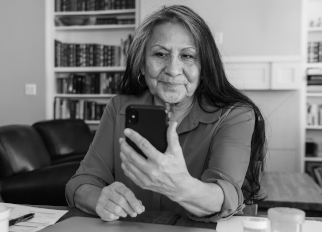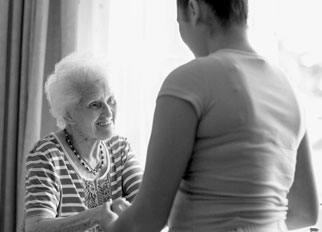Strength and conditioning for your mind
It’s time for a mental fitness check
Sometimes when the people we care about ask how we are, the phrase, “I’m fine” is our immediate response. It can become a crutch instead of us really asking ourselves if it’s true.
Your Blue Cross Blue Shield of Michigan plan gives you private, convenient options to do a mental fitness check. There’s online, over-the-phone and in-person choices, no-cost webinars and more. You can get mental gains from addressing your pain. But you have to put in the work.
Primary care physician
Your partner in seeking treatment
If you're looking for an easy way to connect with a mental health professional, make an appointment with your PCP for a list of references. They may have other behavioral or mental health options for you to try as well.
Don’t have a PCP? You can log in to your Blue Cross member account to find one.
Millions of men experience symptoms of anxiety and depression each year.¹
Anxiety
Men with anxiety tend to have persistent, excessive fear or worry in situations that are not threatening.2
-
A sense of apprehension or dread
-
Feeling restless, nervous or irritable
-
Having a racing or pounding heart
-
Feeling you can't catch your breath
-
Having an upset stomach or 'knots'
Depression
Men with depression have a series of symptoms — including hopelessness — that lasts longer than two weeks.3
-
Feeling hopeless or guilty
-
Loss of interest in activities
-
Having trouble concentrating
-
Having physical aches and pains
-
Changes in sleep or appetite
At-home methods to maximize results

If you’re experiencing symptoms of anxiety or depression, please seek support. You can also use these at-home strategies to manage everyday stress:
Mindful breathing: The 4-7-8 technique
Inhaling for four seconds, holding your breath for seven seconds and exhaling for eight seconds can help to reduce your heart rate when you feel anxious or aggravated.
Set personal goals
Depression can make you feel fatigued and throw you off your regular routine. Setting a few goals to accomplish during the day and including time to be physically active can help improve your mood and energy levels.
Nourish your body
Your physical self is connected to your emotional self. Eating nutrient-rich foods — and avoiding stimulants like caffeine and depressants like alcohol — can help you find balance overall.

DID YOU KNOW
Stress and substance use
When stress builds up, it can be easy to turn to substances like alcohol, vaping, smoking or drugs for relief. But quick fixes can easily backfire.
Substance use can make anxiety, depression and other mental health challenges worse.

PODCAST
The effects of mental health stigma on men
Learn how mental health stigma prevents men from seeking help, ways to combat this stigma and tips for seeking help.
Coping with isolation and loneliness

Finding ways to stay social can help you stay healthy
Meaningful connection is vital for both physical and emotional well-being, especially as we age. Ongoing loneliness can increase the risk of health concerns like depression, high blood pressure and heart disease. But even small efforts to stay social can make a big difference.
- Invite a friend to go on a walk or have a video chat.
- Sign up for an online course or hobby group.
- Try an online group exercise program like SilverSneakers®.
If you’re a senior, explore these resources to help support your overall well-being.
Crisis assistance
Recommended reading

Breaking stress induced habits
Prolonged inactivity and other unhealthy habits are on the rise.
Ditch bad habits
Why self-reflection is key to personal growth
Making time for self-reflection is a key to reducing stress.
Tips to self-reflect
Why it’s important to talk about mental health
Being open about mental health can break down the stigma.
How to get started
You've got the most important job in the world. Let us help you through it.
See parent's guide



Good health unites all of us. Get tips for a strong mind-body connection.
See member's guide- Men’s Mental Health: ‘Man Up’ is Not the Answer, Medical News Today
- Anxiety Disorders, National Alliance on Mental Illness
- Depression, National Alliance on Mental Illness
SilverSneakers is a registered trademark of Tivity Health, Inc. The National Suicide Prevention Lifeline and National Domestic Violence Hotline are independent companies, not affiliated with Blue Cross Blue Shield of Michigan.
The information contained on this webpage is for educational purposes only. Nothing on this webpage is intended to be, nor should be used as or relied upon as, professional medical advice. Nothing contained on this webpage is intended to be used for medical diagnosis or treatment. For medical advice, or to receive medical diagnosis or treatment, consult with your health care provider.


